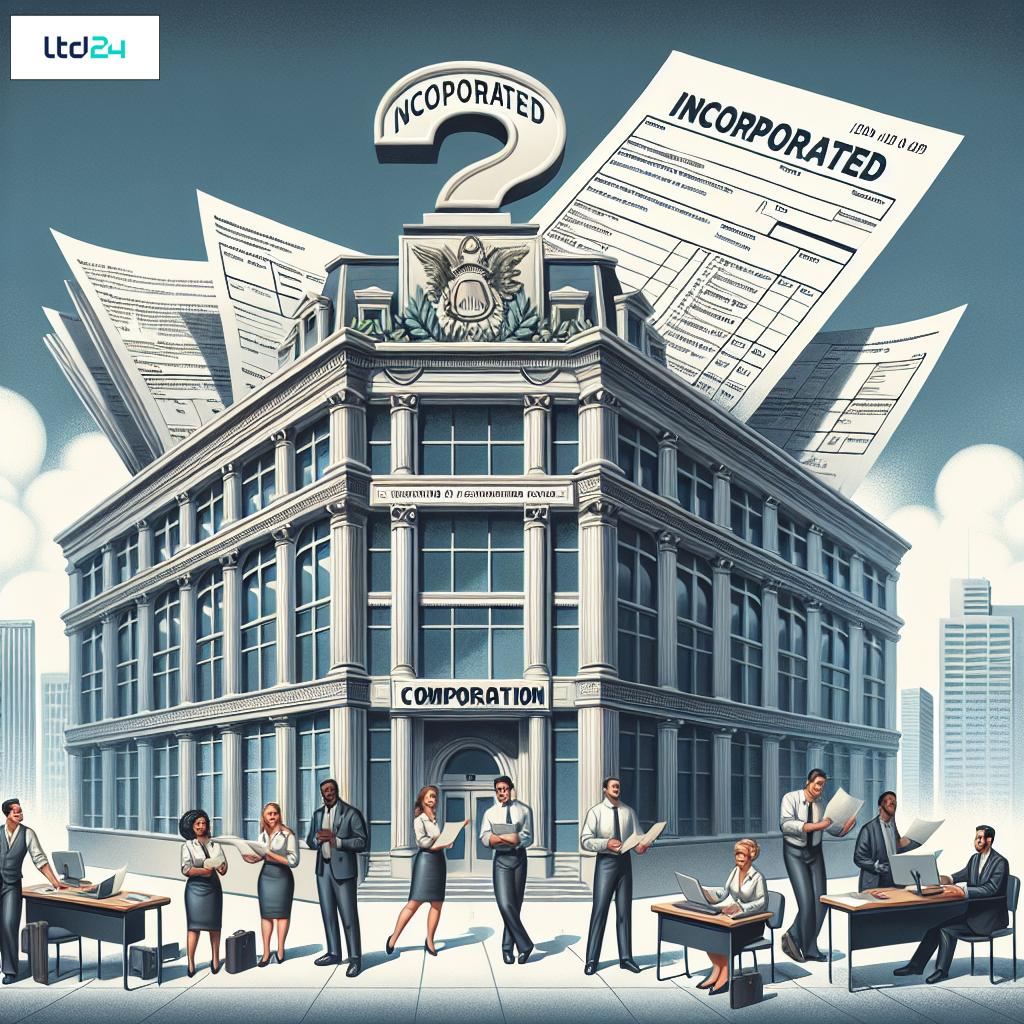Understanding Corporate Status: The Fundamentals
In the complex realm of business structures, determining whether a company has been formally incorporated is a critical preliminary step for potential investors, business partners, and clients. Incorporation refers to the legal process whereby a business entity is formed and recognized as separate from its owners, thereby creating a distinct legal personality. This separation affords various protections, particularly the limited liability shield that safeguards personal assets of shareholders from business liabilities. The incorporation process varies across jurisdictions, with each territory maintaining specific regulatory frameworks and compliance requirements. For international entrepreneurs seeking to establish a corporate presence in multiple markets, understanding these jurisdictional variations is paramount to ensuring proper business formation and ongoing compliance. When conducting due diligence on potential business partners, verification of incorporation status should be among the initial verification procedures to assess legitimacy and corporate standing.
Corporate Registries: The Primary Source of Verification
The most authoritative method to determine if a company is legitimately incorporated is by accessing official corporate registries maintained by governmental authorities. In the United Kingdom, Companies House serves as the central repository of corporate information, maintaining comprehensive records of all registered companies, including UK companies registration and formation details. Similar registries exist globally, such as the Securities and Exchange Commission in the United States, the Australian Securities and Investments Commission, and the Registro Mercantil in Spain. These registries typically provide searchable databases accessible to the public, often via online platforms, where inquirers can verify a company’s registration number, incorporation date, registered office address, director details, and other statutory information. The European Business Register (EBR) offers a consolidated platform for cross-checking corporate registrations across multiple European jurisdictions, facilitating international due diligence processes. Corporate registry searches may incur nominal fees depending on the jurisdiction and the extent of information requested.
Company Documentation: Certificates and Articles
A company’s incorporation status can be verified through examination of its foundational documents. The Certificate of Incorporation represents the primary evidence of corporate existence, issued by the relevant governmental authority upon successful completion of the registration process. This certificate typically contains the company’s unique registration number, date of incorporation, and registered name. Complementing this certificate are the Articles of Incorporation (also known as Articles of Association in some jurisdictions or Certificate of Formation for LLCs), which outline the company’s internal governance structure, shareholder rights, and operational parameters. For UK entities, these documents can be secured through the UK company incorporation and bookkeeping service, providing comprehensive documentation while ensuring compliance with Companies Act 2006 requirements. Additional corroborating documentation may include corporate bylaws, shareholder agreements, and minutes from organizational meetings that collectively establish the corporate governance framework.
Registration Numbers: The Corporate Identifier
Each incorporated entity is assigned a unique registration number that serves as its permanent identifier throughout its corporate lifecycle. In the United Kingdom, this takes the form of a Companies House registration number, while in other jurisdictions it may be referred to as a Business Registration Number, Federal Employer Identification Number (FEIN), or Corporate Identification Number. This alphanumeric identifier remains unchanged regardless of subsequent name alterations or structural reorganizations, providing a consistent reference point for verification purposes. Registration numbers typically follow jurisdiction-specific formats and sequences, enabling quick authentication of their validity. For instance, UK company numbers are typically 8 digits, while US EINs follow a nine-digit format (XX-XXXXXXX). These identifiers are frequently required for various business transactions, tax filings, and regulatory compliance matters, making them essential components of corporate identity. For businesses undertaking company incorporation in UK online, obtaining this registration number marks the official birth of the corporate entity.
Online Verification Tools: Digital Due Diligence
The digital transformation of corporate registries has facilitated efficient verification of incorporation status through various online platforms. Beyond official government databases, numerous third-party services offer aggregated corporate intelligence, incorporating data from multiple jurisdictions to provide comprehensive company profiles. Services such as Dun & Bradstreet, Bureau van Dijk, and OpenCorporates have developed sophisticated search algorithms that enable cross-referencing of corporate entities across global databases. These platforms frequently augment basic registration details with additional business intelligence, including credit ratings, litigation history, and beneficial ownership information. When utilizing online company formation in the UK, entrepreneurs gain immediate digital confirmation of incorporation status, with registration details becoming searchable across these verification platforms. However, prudent due diligence should incorporate verification through official government sources to ensure accuracy, as third-party databases may experience synchronization delays with official records.
Tax Registration: Fiscal Confirmation of Corporate Status
Tax registration records provide supplementary evidence of incorporation status, as legitimate corporate entities must register with relevant tax authorities. In the UK, incorporated companies must register for Corporation Tax within three months of commencing business activities, receiving a Unique Taxpayer Reference (UTR) distinct from their Companies House registration number. Similarly, VAT registration (mandatory for businesses exceeding the statutory turnover threshold) provides additional verification of corporate existence through the issuance of a VAT registration number. For international verification, tax identification numbers such as the Employer Identification Number (EIN) in the US or the Tax Identification Number (NIF) in Spain serve comparable functions. The UK company taxation regime requires distinct registration processes for incorporated entities, creating additional verification points through tax authority databases. Verification of tax registration status typically requires specific authorization due to confidentiality provisions, though basic registration confirmation may be available through public channels.
Legal Name Conventions: Incorporation Indicators
Corporate nomenclature frequently provides immediate indicators of incorporation status through mandated designators that signify limited liability status. In the United Kingdom, incorporated companies must include "Limited" or "Ltd" (for private limited companies) or "PLC" (for public limited companies) in their registered names. Similar conventions exist globally: "Inc." or "Corporation" in the United States, "GmbH" in Germany, "S.A." in France and Spain, and "Pty Ltd" in Australia. These legal designators constitute statutory requirements rather than discretionary branding elements, with unauthorized usage potentially constituting a regulatory offense. When setting up a limited company UK, selection of an appropriate name including the required designation is a fundamental incorporation requirement. The absence of these designators may indicate that an entity operates as an unincorporated business structure such as a sole proprietorship or partnership, though exceptions exist for certain entity types like Limited Liability Partnerships (LLPs) which follow distinct naming conventions.
Registered Office Address: Physical Manifestation of Corporate Existence
Every incorporated company must maintain a registered office address where official communications and statutory notices can be delivered. This address, which must be physical rather than virtual in most jurisdictions, appears in corporate registry records and on formal company communications. The registered office need not be the primary business location but must be capable of receiving official correspondence and maintaining statutory records. For businesses seeking to establish a UK corporate presence without physical premises, business address services provide compliant solutions while meeting statutory requirements. Verification of a company’s registered office can be conducted through registry searches, with discrepancies between claimed and officially registered addresses potentially indicating irregularities warranting further investigation. Changes to registered office addresses must be formally notified to the registry, creating historical address records that may be relevant for comprehensive due diligence processes, particularly for aging corporate entities.
Director Information: Corporate Governance Verification
The identifiable presence of formally appointed directors provides substantive evidence of incorporation, as corporate entities operate through designated officers with statutory responsibilities. Corporate registries maintain records of current and historical director appointments, including personal details to the extent permitted by privacy regulations. Director information typically encompasses names, service addresses, appointment dates, and nationality, with some jurisdictions also requiring disclosure of birth dates for identification purposes. For international entrepreneurs wishing to be appointed director of a UK limited company, specific eligibility requirements must be satisfied, including minimum age requirements and absence of disqualification orders. Director verification serves multiple due diligence purposes, including assessment of experience, identification of potential conflicts of interest through multiple directorships, and detection of disqualified individuals serving in contravention of legal prohibitions. Corporate governance structures vary by jurisdiction and company type, with public companies typically subject to more stringent board composition requirements than private entities.
Financial Statements and Annual Returns: Ongoing Compliance Indicators
Incorporated companies must fulfill periodic filing obligations that generate public records confirming ongoing existence and compliance status. Annual returns (renamed Confirmation Statements in the UK since 2016) provide updated snapshots of basic company information, including registered office address, director details, and shareholder information. Complementing these administrative filings are financial statements that must be prepared and submitted according to statutory timetables, with specific requirements varying based on company size and classification. These documents become part of the public record accessible through corporate registries, enabling verification not only of incorporation but also of continued active status. Examination of filing history can reveal compliance patterns, with missing or consistently late filings potentially indicating governance deficiencies. For companies undertaking UK company formation for non-residents, understanding these ongoing filing obligations is essential to maintain good standing and avoid potential penalties or involuntary dissolution.
Share Structure: Capital Composition Analysis
The formal share structure of a company provides definitive evidence of incorporation, as the issuance and allocation of shares represent fundamental aspects of the corporate form. Corporate registries typically maintain records of authorized and issued share capital, including share classes, nominal values, and (in some jurisdictions) significant shareholders. Share certificates issued to investors constitute physical evidence of corporate structure, containing details of shareholding and typically bearing official company seals or authorized signatures. For established companies, understanding how to issue new shares in a UK limited company is essential for capital raising and restructuring activities, with each issuance requiring specific documentation and registry notifications. Share registers maintained at the registered office provide comprehensive historical records of share transfers and allocations, though access to these documents may be restricted to shareholders and authorized parties. Sophisticated corporate intelligence databases frequently include beneficial ownership information where publicly available, facilitating identification of ultimate controlling interests behind corporate structures.
Trading Status: Active vs. Dormant Companies
Verification of incorporation must distinguish between mere registration and operational activity, as companies may exist in various states from active trading to dormancy or pre-dissolution proceedings. A company may be legitimately incorporated yet remain dormant (non-trading), maintaining its legal existence while conducting no business transactions. Conversely, an active company engages in commercial activities, generating financial transactions that appear in statutory accounts. Corporate registries typically indicate company status through designations such as "Active," "Dormant," "In Administration," or "In Liquidation," providing immediate indicators of operational condition. Companies may legitimately transition between active and dormant states according to business requirements, with each status carrying specific compliance obligations. For entrepreneurs planning to set up an online business in UK, understanding these status classifications and their implications for reporting requirements is essential for effective compliance planning. Company status verification should form part of comprehensive due diligence, particularly for high-value transactions or contractual relationships with extended performance periods.
Cross-Border Verification: International Corporate Structures
Multinational corporate structures present unique verification challenges requiring specialized approaches to confirm incorporation status across multiple jurisdictions. Companies may establish subsidiary entities, branch offices, or representative operations in foreign territories, each with distinct legal status and registration requirements. International corporate registries vary significantly in transparency, accessibility, and information disclosure, necessitating jurisdiction-specific verification strategies. For complex corporate groups, organization charts depicting parent-subsidiary relationships provide essential context for understanding corporate structure and appropriate verification points. Services such as offshore company registration UK assist in establishing compliant international structures while ensuring proper registration across relevant jurisdictions. Corporate service providers specializing in international formations often maintain comprehensive databases of client companies, potentially offering verification services subject to confidentiality constraints. The International Business Registers Report published by international registry associations provides valuable insights into verification procedures across global jurisdictions, highlighting best practices and common challenges in cross-border verification processes.
Legal Entity Identifiers: Global Corporate Identification
The Legal Entity Identifier (LEI) system represents a significant advancement in standardized corporate identification, providing a 20-character alphanumeric code that uniquely identifies legal entities participating in financial transactions globally. Established following the 2008 financial crisis to enhance transparency in financial markets, LEIs are issued by Local Operating Units (LOUs) accredited by the Global Legal Entity Identifier Foundation (GLEIF). While primarily required for entities engaged in securities and derivatives transactions, the LEI system increasingly serves broader corporate identification purposes across multiple sectors. The GLEIF maintains a publicly searchable database of all issued LEIs, providing basic corporate information including legal name, registered address, and corporate form. For entities establishing international operations through services such as company registration with VAT and EORI numbers, securing an LEI provides additional verification credentials while facilitating cross-border transactions. LEI records contain "relationship data" identifying parent entities and ultimate beneficial owners, enhancing transparency across complex corporate structures and facilitating comprehensive verification processes.
Trademark and Intellectual Property Registrations: Supplementary Verification Sources
Corporate intellectual property registrations provide supplementary evidence of incorporation status, as trademark, patent, and design registrations typically require formal corporate existence for registration eligibility. Intellectual property databases maintained by national and international authorities such as the UK Intellectual Property Office, the United States Patent and Trademark Office, and the European Union Intellectual Property Office contain corporate ownership information that can corroborate incorporation status. These registrations not only verify corporate existence but may also indicate operational activity through continued maintenance of intellectual property rights. When setting up a limited company in the UK, securing intellectual property registrations represents a prudent early step in business establishment, creating additional verification points across multiple databases. Corporate name changes are typically reflected in intellectual property assignment records, providing historical continuity for verification purposes despite corporate rebranding initiatives. While intellectual property registration should not serve as primary verification of incorporation, it provides valuable corroborative evidence within comprehensive due diligence processes.
Domain Name Registrations: Digital Corporate Footprints
Domain name registrations associated with corporate entities provide supplementary verification sources, particularly for digitally-oriented businesses. WHOIS databases maintained by domain registrars and regional internet registries contain registrant information that may include corporate details such as registered name, address, and contact information. While privacy protection services increasingly shield specific registrant details from public view, even redacted records typically indicate whether the registrant is identified as a company rather than an individual. For businesses utilizing formation agent services in the UK, domain registration often forms part of comprehensive establishment packages, creating consistent digital identities aligned with formal corporate registrations. Corporate domain portfolios frequently expand beyond primary business domains to include defensive registrations, product-specific domains, and geographic variations, collectively establishing substantial digital footprints that corroborate corporate existence. Domain registration dates may provide contextual information regarding business establishment timelines, though the correlation between domain acquisition and formal incorporation is not necessarily direct.
Banking Relationships: Financial Verification Channels
Corporate banking relationships provide strong indirect evidence of incorporation status, as financial institutions implement rigorous customer due diligence processes requiring verification of legal existence before account establishment. Corporate bank accounts typically require submission of incorporation certificates, constitutional documents, and board resolutions authorizing account operation, creating comprehensive verification files within banking systems. While direct access to banking records is restricted by confidentiality provisions, confirmation of banking relationships through authorized references provides substantial assurance of corporate legitimacy. For businesses utilizing ready-made companies in the UK, establishing banking relationships represents a critical post-acquisition step requiring demonstration of proper corporate structure and ownership transition. Corporate payment instruments such as checks, credit cards, and payment processing accounts bearing the company name provide tangible evidence of established banking relationships predicated on verified incorporation status. International banking relationships become increasingly complex for multinational entities, with each jurisdiction implementing distinct account opening procedures aligned with local regulatory requirements and corporate verification standards.
Industry-Specific Licenses and Permits: Regulatory Verification Sources
Regulated industries require specific licenses and permits that provide definitive evidence of incorporation status, as regulatory authorities implement thorough verification procedures before granting operational authorization. Financial services firms must secure regulatory permissions from authorities such as the Financial Conduct Authority (UK) or the Securities and Exchange Commission (US), with licensee databases providing publicly accessible verification sources. Similarly, utility companies, telecommunications providers, pharmaceutical manufacturers, and numerous other regulated sectors maintain formal registrations with industry-specific authorities, creating multiple verification points across regulatory databases. For entrepreneurs establishing operations through company formation in Bulgaria or other specialized jurisdictions, understanding industry-specific licensing requirements forms an essential component of compliant business establishment. Regulatory filings typically include comprehensive corporate details including registration numbers, registered addresses, and responsible officers, facilitating cross-referencing with corporate registry information. While licensing requirements vary substantially across industry sectors and jurisdictions, the presence of industry-specific authorizations provides compelling evidence of legitimate incorporation and operational compliance.
Corporate Websites and Digital Presence: Online Verification Indicators
A company’s digital presence provides contextual information supporting incorporation verification, though requiring corroboration through official sources. Corporate websites typically include essential identifying information such as registered company names (including appropriate designators), registration numbers, and registered office addresses, often presented in website footers or dedicated "Legal Information" sections. In many jurisdictions, disclosure of this information constitutes a regulatory requirement rather than discretionary transparency, particularly for e-commerce operations. Companies with substantial digital footprints across multiple platforms including social media, business directories, and industry associations present verification opportunities through consistency analysis, with matching corporate identifiers across diverse platforms suggesting legitimate establishment. For businesses utilizing online business setup services in the UK, developing consistent digital branding aligned with registered corporate identity represents a fundamental aspect of business establishment. While sophisticated fraudulent operations may create convincing digital facades, cross-referencing online information with official registry data quickly exposes discrepancies indicative of potential misrepresentation.
Professional Advisors and Corporate Service Providers: Verification Assistance
Professional advisors including attorneys, accountants, and corporate service providers can facilitate incorporation verification through their involvement in company formation and ongoing compliance management. These professionals typically maintain comprehensive client records including incorporation documentation, constitutional instruments, and compliance histories. While direct verification through professional advisors requires client authorization due to confidentiality obligations, their willingness to confirm advisory relationships (subject to client consent) provides indirect verification of corporate legitimacy. Corporate service providers specializing in company registration in Ireland or other jurisdictions maintain extensive databases of client companies, potentially offering verification services within confidentiality constraints. Reputable service providers implement thorough client onboarding procedures including corporate existence verification before accepting engagements, creating an additional layer of validation for entities utilizing their services. Professional advisor relationships are particularly significant for verification of international corporate structures, where local representation requirements often necessitate engagement of jurisdiction-specific service providers with comprehensive knowledge of local regulatory frameworks.
Common Red Flags: Identifying Potential Incorporation Irregularities
Effective incorporation verification includes awareness of warning signs that may indicate misrepresentation or irregularities in corporate status claims. Discrepancies between claimed and officially registered corporate names, including inconsistent use of required designators, represent primary indicators warranting further investigation. Similarly, inability to produce fundamental corporate documentation such as incorporation certificates or constitutional documents raises significant concerns about claimed corporate status. Registered addresses that prove non-existent, residential rather than commercial (where prohibited by local regulations), or associated with mass company formation addresses without corresponding service agreements suggest potential compliance deficiencies. Recent incorporation dates combined with claims of extensive operational history indicate potential misrepresentation, while director profiles featuring individuals with multiple simultaneous appointments across unrelated businesses may signal nominee arrangements designed to obscure actual control. For businesses establishing UK entities through open LTD in UK services, ensuring transparent and compliant structures from formation minimizes future verification challenges and enhances business credibility. Recognition of these warning signs enables proportionate escalation of due diligence efforts when standard verification processes reveal concerning indicators.
Expert Assistance: Securing Professional Incorporation Verification
For complex verification scenarios involving international corporate structures, historical entities, or high-value transactions, engaging specialized corporate intelligence services provides comprehensive verification beyond standard registry searches. Professional investigators employ advanced verification methodologies including in-person registry searches in jurisdictions with limited online accessibility, site visits to verify physical presence at registered addresses, and specialized database access transcending public information limitations. Corporate intelligence firms frequently maintain proprietary databases aggregating information across multiple jurisdictions, enabling efficient cross-referencing of corporate entities and associated individuals. For transactions involving companies in the USA, where state-level incorporation creates verification complexities across 50+ distinct registries, specialized verification services provide efficient due diligence solutions. While engaging these services involves significant investment, the cost-benefit analysis proves favorable for high-value transactions where comprehensive verification directly mitigates substantial financial and reputational risks. Professional verification reports typically include documented evidence sources, verification methodologies, and comprehensive findings suitable for inclusion in formal due diligence documentation.
Navigating Your International Corporate Verification Needs
Determining whether a company is properly incorporated requires systematic investigation utilizing multiple verification sources, with appropriate methodologies determined by transaction value, relationship significance, and jurisdictional complexity. Initial verification through official corporate registries establishes fundamental incorporation status, while supplementary sources including tax registrations, published accounts, and regulatory filings provide corroborative evidence supporting comprehensive verification conclusions. For international entrepreneurs establishing multi-jurisdictional corporate structures, understanding incorporation verification procedures in target markets facilitates development of transparent and easily verified corporate identities enhancing business credibility. The evolving regulatory landscape increasingly emphasizes corporate transparency and beneficial ownership disclosure, progressively simplifying incorporation verification while complicating non-transparent corporate structuring. For specialized assistance with international corporate structures and verification challenges, directors’ remuneration optimization, or cross-border tax planning, professional advisory services provide tailored solutions addressing specific business requirements.
Comprehensive Corporate Solutions with LTD24
If you require expert guidance navigating the complexities of international corporate structures, verification procedures, or cross-border compliance requirements, our specialized team offers tailored solutions addressing your specific business needs. We are a boutique international tax consulting firm with advanced expertise in corporate law, tax risk management, asset protection, and international audits. Our bespoke advisory services support entrepreneurs, professionals, and corporate groups operating across global markets, delivering practical solutions to complex international business challenges.
Book a personalized consultation with one of our specialists at $199 USD/hour and receive concrete answers to your corporate and tax inquiries. Our pragmatic approach focuses on actionable strategies aligned with your business objectives while ensuring robust compliance across all relevant jurisdictions. Schedule your consultation today and leverage our extensive experience to optimize your international corporate structures.










